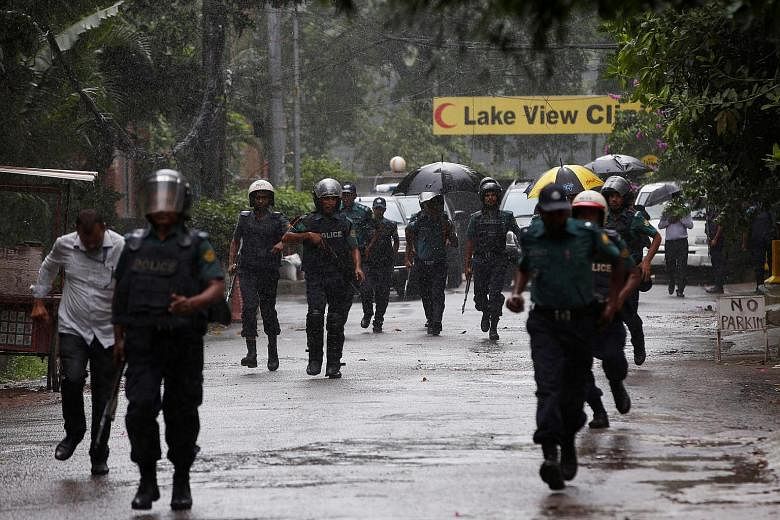In its editorial on July 4, the paper urges the government to pay attention to terror-related information, pointing out that Japanese working on development projects in Bangladesh got ensnared in the vicious terrorist attack.
A group of gunmen seized a restaurant in Dhaka and took hostages, including a number of foreign customers, then killed and injured many.
Seven Japanese working on a project of the Japan International Cooperation Agency were killed and another wounded.
The atrocity was aimed at a "soft target" - a place where large numbers of people gather. Prime Minister Shinzo Abe told his Bangladeshi counterpart Sheikh Hasina over the phone: "This kind of abominable, cruel act can never be condoned, no matter what the reasons for it were."
The prime minister's condemnation was natural.
The attackers reportedly shouted "Allahu Akbar" (God is great) as they fired their weapons in the restaurant, while also throwing explosives at police officers who rushed to the site.
Exchanges of gunfire and explosions were heard when Bangladeshi security forces stormed the restaurant about 10 hours later, according to reports.
We hope the Bangladeshi government will reveal the whole picture of the attack and details about the rescue operations, including how the captives were killed.
The Islamic State of Iraq and Syria (ISIS) militant group has called for terrorist attacks during Ramadan, the Islamic month of fasting, which ends early this month.
ISIS claimed responsibility for the attack via its media arm, although there were also some views that an affiliate of the Al-Qaida international terrorist organization was responsible.
Muslims account for 90 per cent of Bangladesh's population.
It is undeniable that the threat of terrorism has been spreading to the country from the Middle East, Africa and Europe.
Since last year, there have been a series of fatal attacks and threats targeting, most notably, writers critical of Muslim radicals, members of the Hindu minority and foreigners. A group claiming to be an ISIS affiliate said it had carried out about 20 of these attacks.
Hasina consistently maintains that ISIS has no presence in her country. She claims opposition parties have been involved in these attacks.
We suspect that the Bangladeshi prime minister is using the terrorist attacks to eliminate her political rivals.
Abe cancelled stump speeches he planned to make as part of the House of Councillors election campaign, and issued instructions at the Prime Minister's Office.
Seiji Kihara, state minister for foreign affairs, was ordered to deal with the attack in Dhaka. He will be helped by an emergency response team that includes doctors and the unit tasked with gathering intelligence on international terrorism, which was set up last year and placed under the direct supervision of the Prime Minister's Office.
"There are no problems with [the government's] crisis readiness," Deputy Chief Cabinet Secretary Koichi Hagiuda said. It is vital to place priority on providing the Japanese affected by the attack with medical care and support so they can return home.
The government, JICA and other organisations concerned should beef up efforts to gather and analyse intelligence on terrorism, and provide warnings to Japanese living or travelling abroad.
It is no longer rare for Japanese to be ensnared in terrorist assaults abroad and ISIS has also threatened to target Japanese.
It is important to pay close attention to safety information on other countries.
* The Japan News is a member of The Straits Times media partner Asia News Network, an alliance of 21 newspapers.

